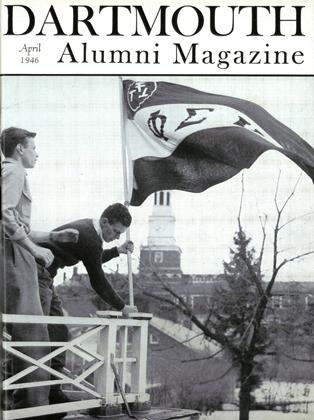Colleges point with pride to their alumni who are senators, Presidents or national figures in any field. Merit obviously reflects on the college whose graduates "make names for themselves" and become "big" men in the Nation or the world. There is a natural reaction, approaching smugness, to the thought that Alma Mater has prepared another Titan for the times.
Dartmouth's new president, John Sloan Dickey, sees the college's responsibility in supplying leadership as a good deal more comprehensive than is indicated in the education of a comparatively small group of men whose names are known wherever newspapers are read. In his first appearance before an alumni group since he succeeded Ernest Martin Hopkins at Hanover, Mr. Dickey recently told the Dartmouth Alumni Association of Boston that leadership in the community, not leadership in Washington, is the requisite for solving the problems of today and tomorrow. He announced plans for a new course at Dartmouth which envisions the preparation of the student for eventual leadership in his own community. The course, dealing with social, political and business problems, will be required in the senior year, and will bring outstanding leaders in various fields to the college to give the students the practical views of men who have met and mastered the problems they will encounter in their own communities after they are graduated.
"The world has learned to look behind the President and Congress to the people," he said. "We've got to have back that decentralized leadership in this country that can move the Senate and the Administration in the decisions ahead."
This conception of leadership on a modest parochial scale is one that has lost force in these times because local leaders all too often have their eyes on the top. There are, of course, just a few places at the top, and the result frequently is that the man who should take an active part in the affairs of his own community is indifferent to them. He does not figure that he can get anywhere; he shuns politics as a messy field, not realizing that its improvement depends upon the active civic enterprise of men like himself, who should do something more than sit back and deplore things as they are.
In city after city we see the election of incompetents to municipal offices, men who lack intellectual capacity, social vision, even common honesty. Their forte is ward politics. After they have pushed enough doorbells to be reckoned with as a factor in elections, they are recognized by others who "came up" the same way, and are backed as candidates for office. They are the products of the machine, rather than the products of democracy, because of the inanition of the men and women who criticize them as mere politicians, but do nothing to promote better government by active participation in the political life of the communities themselves.
The do-nothing element is not confined to college graduates by any means. Men and women who never went to college do not exert themselves for better government for the same reasons that prompt college graduates to throw up their hands in disgust and say that nothing can be done about it.
Community leadership, as the Dartmouth president says, can be the insistent and effective monitor of national leadership. By and large, national leadership evolves from community leadership, and the quality of one depends upon the quality of the other to a great extent.
Russell Sage's theory that there are acres of diamonds at your own back door comes to mind in the contemplation of opportunities for leadership in the community. A collegiate course designed to train young men to exploit them, without the selfish thought of great personal advancement in the national arena, shows a far-sightedness in academic policy that is highly commendable at a time when the realities of the world are becoming more and more important in the province of higher education.
 View Full Issue
View Full Issue
More From This Issue
-
 Class Notes
Class Notes1918
April 1946 By ERNEST H. EARLEY, DONALD L. BARR -
 Article
ArticleLabor Marches With the Times
April 1946 By MALCOLM KEIR, -
 Article
ArticleTHE NEW CURRICULUM
April 1946 By PROF. HUGH S. MORRISON '26, -
 Class Notes
Class Notes1917
April 1946 By MOTT D. BROWN, DONALD BROOKS -
 Class Notes
Class Notes1911
April 1946 By NATHANIEL G. BURLEIGH, EDWIN R. KEELER -
 Article
ArticleEducational Aims
April 1946 By PROF. CHARLES LEONARD STONE '17







